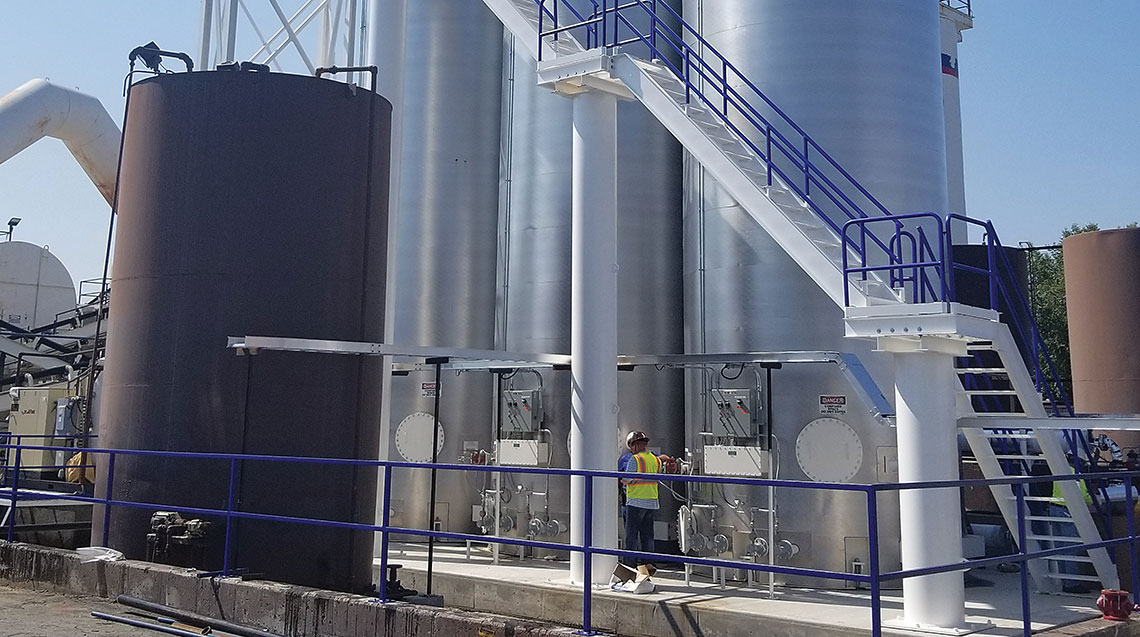
Clean-Powered Production
Plant Upgrade Helps Blythe Construction Meet Sustainability Goals
As one of Southeast United States’ premiere infrastructure construction firms, Blythe Construction, Inc., operates 13 asphalt plants across North and South Carolina, producing more than 1 million tons of hot mix and recycled asphalt annually. It is a source of pride for Blythe that every one of its asphalt plants is a recipient of the coveted NAPA Diamond Achievement Commendation for operational excellence.
Covering aspects that range from plant appearance to safety to regulatory compliance and community relations, the Diamond Achievement Award also includes a sustainability component that gauges a facility’s effectiveness at implementing environmental goals. For Blythe and its parent entity, Paris, France-based Eurovia Company, the environmental focus has increasingly become a priority within its operational practices – in particular, reducing the environmental impact of the roadbuilding industry. Because of this, Eurovia has set forth an initiative to reduce emissions from its asphalt plants by converting the plants to electric heat for their asphalt tanks, hot oil heaters and more. The first Eurovia-owned U.S. plant to make this switch is Blythe Construction’s North Plant on Reames Road in Charlotte, North Carolina. The company completed the upgrade in September 2019.
Driving Towards Environmental Excellence
“Eurovia’s emphasis has been to change its asphalt plants overseas to all electric in an effort to reduce emissions. They now are working to upgrade our plants here in the U.S. to electric heat,” notes Tim Mitchell, Blythe Construction, Inc.’s North Carolina Plant Manager. “At the North Plant tank farm, we installed three new asphalt cement tanks, five new silos and a hot oil heater this past summer. We upgraded all three tanks and the hot oil heater to include drywell-style electric heat, rather than propane burners, because the burners are inefficient and create emissions.”
Mitchell explains that the three vertical 30,000-gallon asphalt cement tanks were all manufactured by Meeker Equipment Company of Belleville, Pennsylvania. Each is heated with a Lo-Density® Unitized Storage Tank Heater from Seattle, Washington-based Process Heating Company (PHCo). The plant’s new hot oil circulating heater also is manufactured by PHCo and features Lo-Density drywell-style heat. “Eurovia had specced everything out, and they specified the drywell-style electric heaters,” says Mitchell. “Meeker was our tank supplier for the project.”
PHCo’s Lo-Density Unitized Storage Tank Heater heaters are often specified into both new and existing asphalt tanks, as they can easily be installed into any horizontal or vertical above-ground tank or vat, even as a retrofit. The unique low-watt-density drywell-style heaters dissipate controlled heat as low as three watts per square inch on the heater’s sheath to prevent coking or damaging of temperature-sensitive asphalt or emulsions. These materials often experience damage when too much heat is applied to them too quickly, as is the case with gas or other fossil fuel burners. Asphalt and emulsions ideally should be heated by a carefully controlled system that reduces their viscosity.
With the PHCo’s indirect heating systems, like its Lo-Density Hot Oil Circulating Heaters, heat from electric energy is transferred to the oil, which then carries it to the area or process where it is needed. Using PHCo’s unique, patented Coil-Lock-design heating elements, which also reside within a drywell, the hot oil transfer heat units dissipate controlled heat as low as eight watts per square inch on the heater’s sheath, eliminating coking or carbonization of the transfer oil.
Safe, Consistent, and Environmentally Friendly
As a means for Eurovia and Blythe Construction, Inc., to meet their environmental goals, the Lo-Density heat provides the emission-free benefits the companies were seeking. As a matter of fact, electric heat is safe, consistent and friendly to the environment because it heats without combustion or emissions, and it eliminates a source of fuel spills. Electric heat offers 100% energy efficiency because all of the energy is used to heat, a level of efficiency that fossil-fuel-burning heaters will never match. Electric heat can reduce operating costs, as it eliminates stacks that must be monitored for emissions, as well as eliminating air quality and boiler permits that must be acquired and maintained. Electric heaters also can be interfaced and coordinated with other plant electrical equipment so that the load of the heaters is reduced to base rates, thus preventing increased demand charges or peak-use rates and lowering consumption cost. In addition, the drywell design of PHCo’s heaters – including storage tank heaters and hot oil circulating heaters – allows access to the heating elements from outside of the system, so they may be serviced without draining the tank or heater.
Keen on Clean
Since the plant was brought online, Mitchell says he has been pleased with its performance. “Moving from tank to tank, the (material) temperature can drop some. But with it now being self-controlled at each tank, the Process Heating units keep everything at an even temperature,” he says.
“Because the heating elements are in a drywell, you have more control over the heat. With the natural gas burners we used before, we always had issues with the asphalt or hot oil first cooling then spiking in temperature – creating problems with coking and burning,” Mitchell continues. “I was somewhat familiar with this style of heater prior to the upgrade. We have one Process Heating heater at another location in an asphalt tank. In my experience, it has maintained the heat beautifully in that tank – controlling it a lot better, without coking in the bottom of the tank or around the elements.”
With the completion of its North Plant upgrade, Blythe Construction, Inc., will be following a plan set forth by Eurovia to upgrade each of its U.S. asphalt plants in turn.
“As older equipment becomes inefficient and needs to be replaced, we will continue to upgrade to the low-(watt)-density electric heat,” Mitchell says. “In 2021, there are a set of tanks in Raleigh (North Carolina) that will be replaced, and we intend to use the Process Heating Lo-Density heaters for those.”
To read the AsphaltPRO article, Click Here.
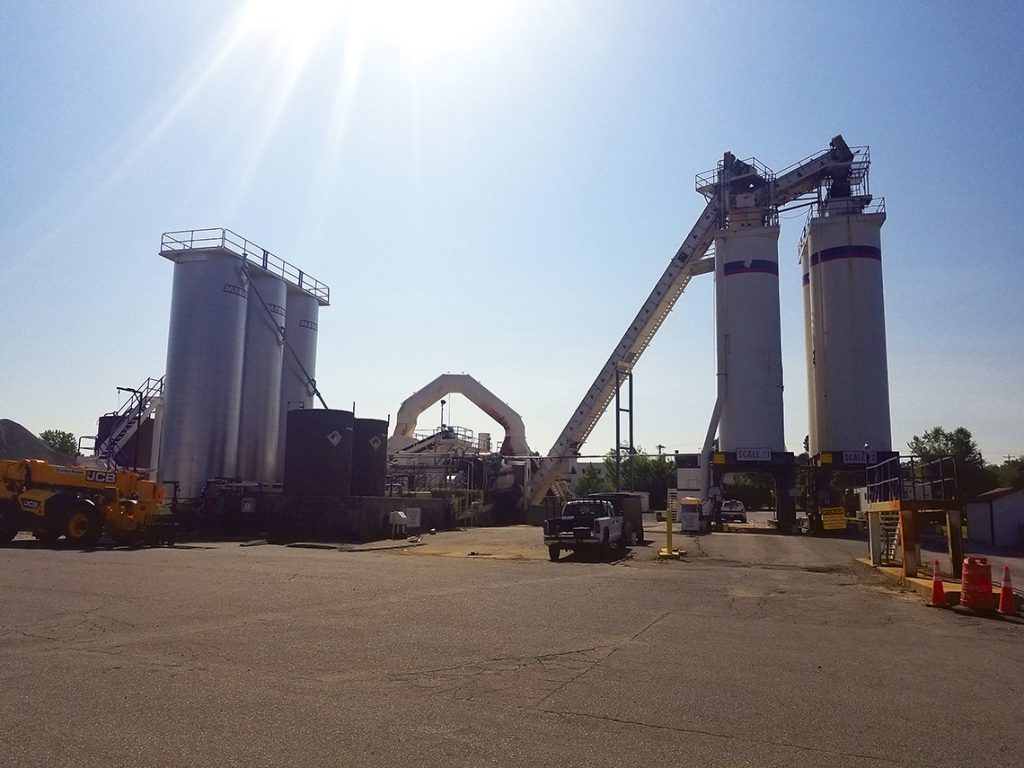
For Blythe and its parent entity, Paris, France-based Eurovia Company, an environmental focus has increasingly become a priority within its operational practices. In fact, Eurovia has set forth an initiative to reduce emissions from its asphalt plants by converting the plants to electric heat for their asphalt tanks, hot oil heaters and more. The first Eurovia-owned U.S. plant to make this switch is Blythe Construction’s North Plant in Charlotte, North Carolina.
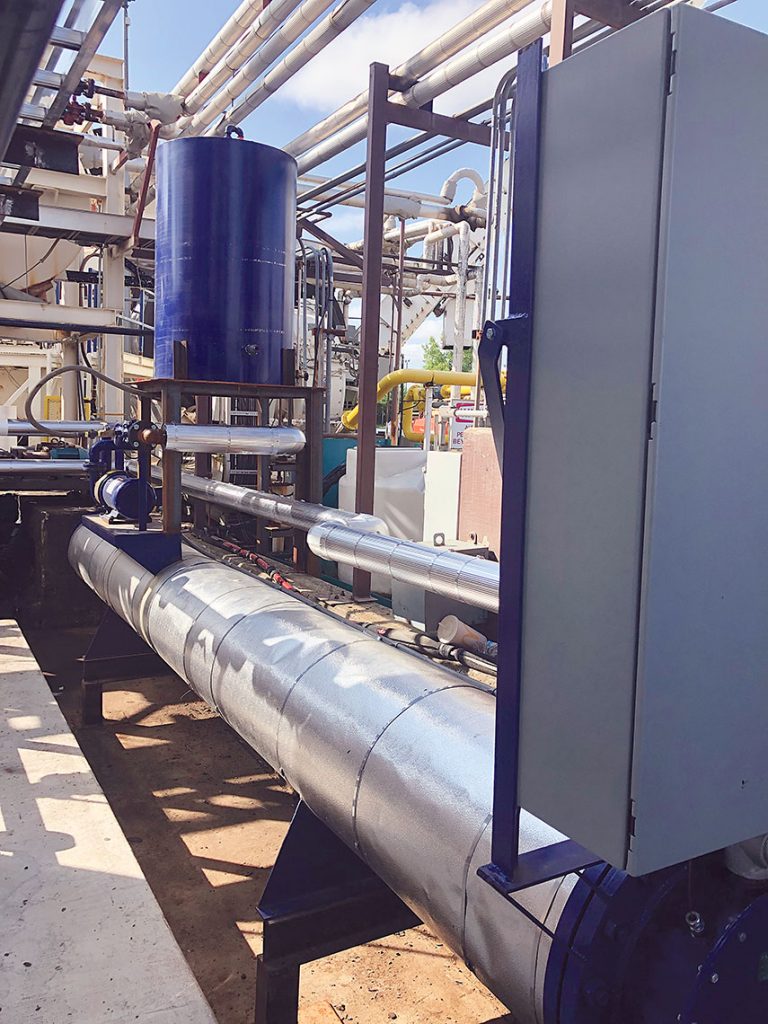
With PHCo’s indirect heating systems, like its Lo-Density Hot Oil Circulating Heaters, heat from electric energy is transferred to the oil, which then carries it to the area or process where it is needed.
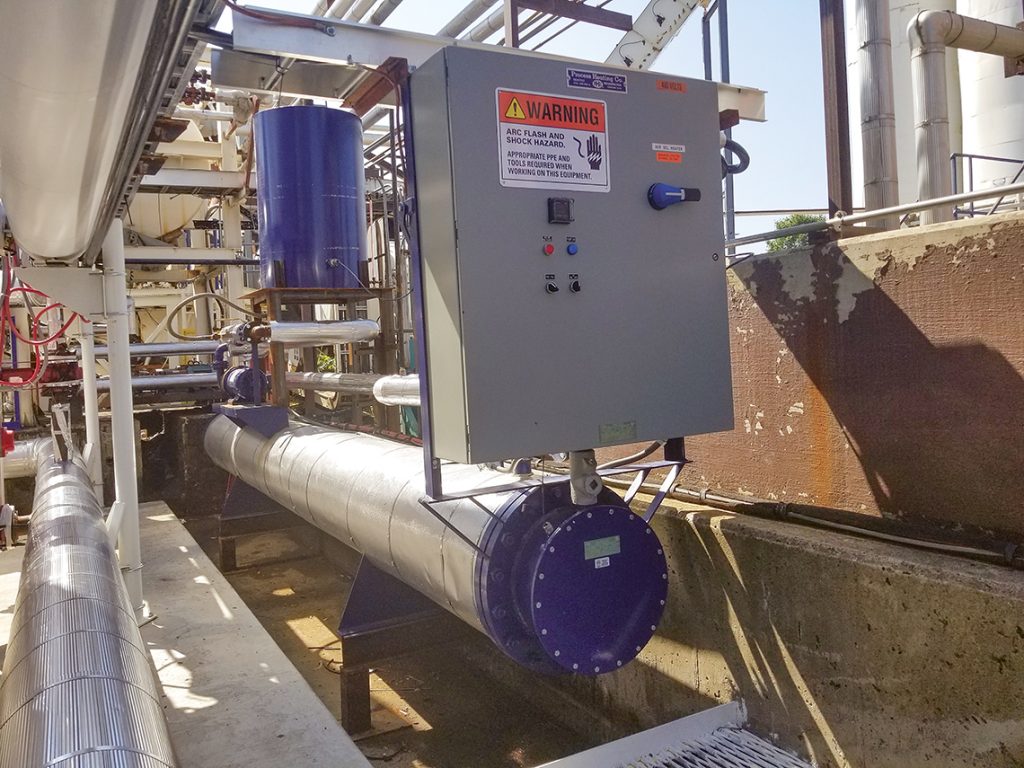
Using PHCo’s unique, patented Coil-Lock-design heating elements, which reside within a drywell, the hot oil transfer heat units dissipate controlled heat as low as eight watts per square inch on the heater’s sheath, eliminating coking or carbonization of the transfer oil.
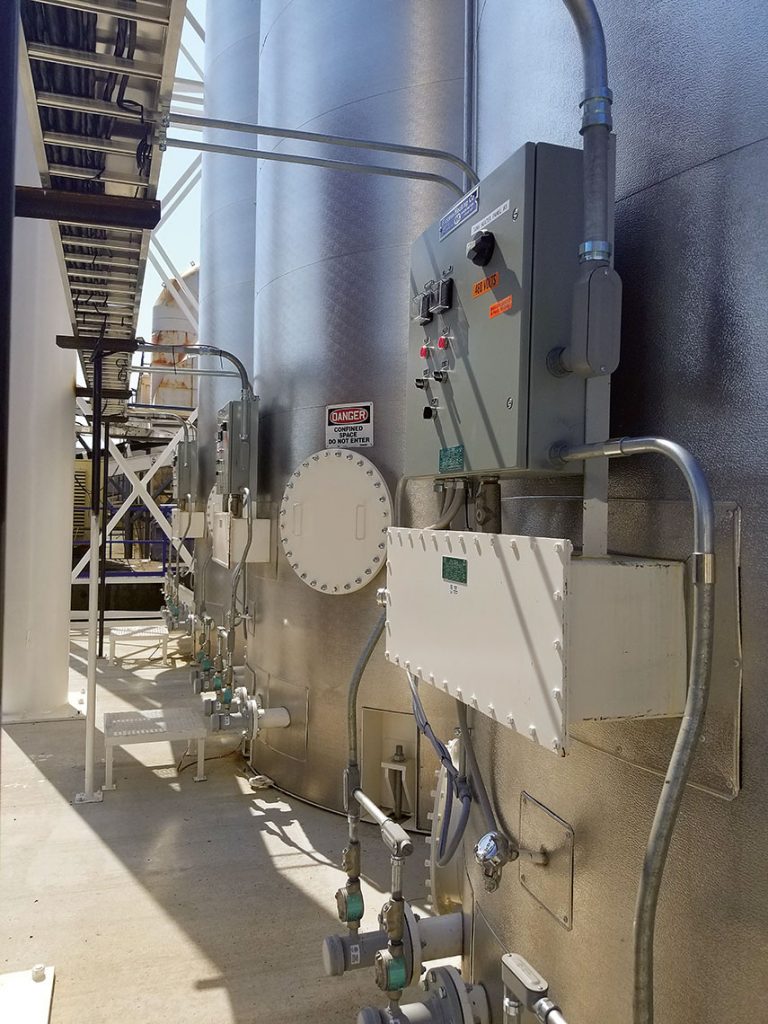
Blythe Construction, Inc., installed three new vertical 30,000-gallon asphalt cement tanks, five new silos and a hot oil heater in the summer of 2019. The company upgraded all three tanks and the hot oil heater to include Lo-Density® drywell-style electric heat from Process Heating Company (PHCo), rather than propane burners, because the burners are inefficient and create emissions.
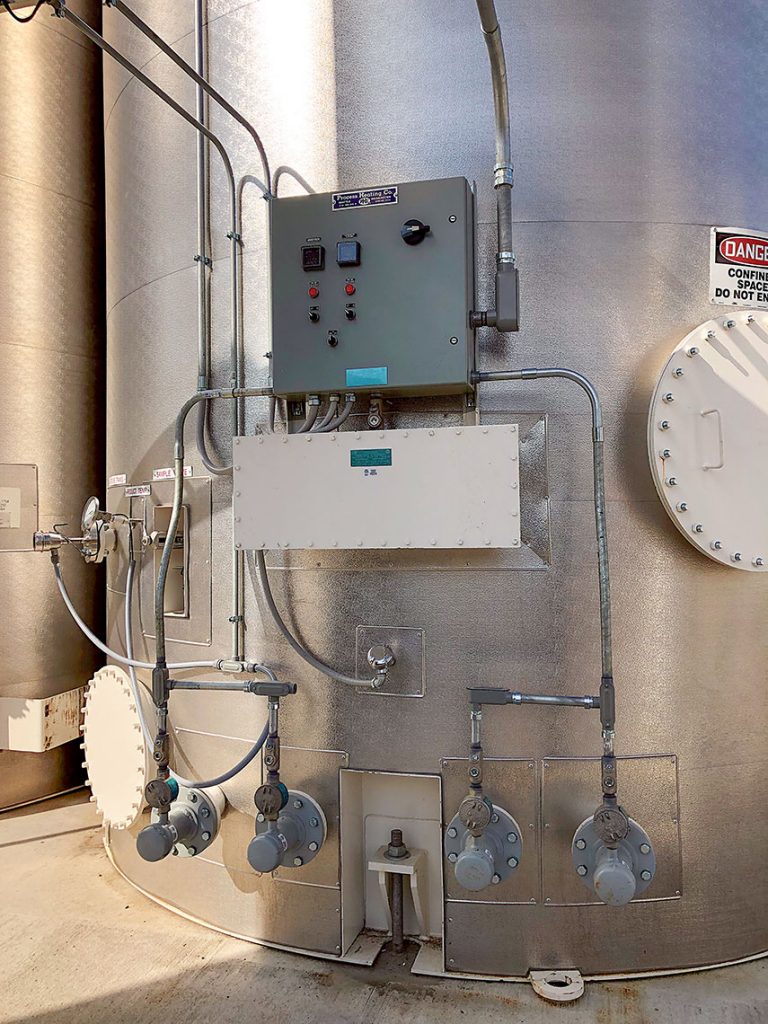
PHCo’s Lo-Density Unitized Storage Tank Heater heaters are often specified into both new and existing asphalt tanks, as they can easily be installed into any horizontal or vertical above-ground tank or vat, even as a retrofit.

